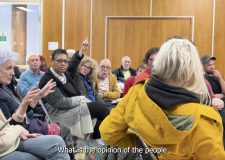Brighton and Hove CAB offers help dealing with heating bills
Brighton and Hove Citizens Advice Bureau has seen a big rise in the number of people seeking help over the past few years.
And dealing with rising fuel bills has become a growing cause for concern.
This week the CAB has organised an event called Big Energy Week, with its national umbrella organisation – Citizens Advice – working in co-operation with other consumer and advice groups.
As well as the usual advice and drop-in sessions at Hove Town Hall, the CAB is holding a drop-in session at the Jubilee Library in Brighton on Thursday (19 January).
Last week the energy company EDF announced a cut in the price of gas from next month but the 5 per cent reduction is overshadowed by the 15 per cent rise last November.
And that price rise was one of a number over the past few years. Fuel poverty is still a big worry for many.
The report below about Brighton and Hove CAB – which appears in Latest magazine today (Tuesday 17 January) – looks at some of the issues that are worrying people and what advice is available.
The new year rush
This winter may have been milder than last year and the year before, but more people than ever are worried about paying their gas and electricity bills.
Temperatures may not have plummeted but many people’s incomes have. And one place they’re noticing the trend is at the Brighton and Hove Citizens Advice Bureau (CAB).
The waiting room is regularly full to capacity with people desperate for help.
Just as the shops tend to be busy with the January sales, the CAB has its own equivalent rush in the new year.
And while energy bills are one of the biggest concerns at the moment, they are part of a bigger picture.
Debts and welfare benefits are two other difficult areas driving hundreds of people a week to seek advice.
And housing problems and questions about employment rights are also hot topics as more people face losing their jobs.
Edlira Alku, 28, interim director of the Brighton and Hove CAB, said: “We see approximately 6,000 clients a year.
“Last year we had a 20 per cent increase in client contacts and an increase in the complexity of clients’ cases.
“We provide outreach services at the Jubilee Library, GP surgeries and hospitals in town.
“About 86 per cent of our clients are new. Others return for further advice in case of a change in circumstances.
“We have more and more clients coming in for advice about debt issues. At Christmas a lot of people enter into debt or they put it off and by the second or third week of January all the bills come in.
“A lot of clients come in because they lose their job. They can’t afford to pay their mortgage and they fall into debt. Often that can coincide with a relationship breakdown.
“We’re seeing more cases and they’re more complex. This is one of the reasons why I believe the CAB is excellent because we provide advice on anything.
“I know it’s an overused word, but we can provide a more holistic approach.
“A lot of people are very proud and don’t want to sign on. You don’t have to sign on to receive all the benefits that are available. £20 billion in benefits goes unclaimed every year.
“A lot of people think that because they go out and work they don’t qualify for benefits but they might qualify for tax credits, for example.”
In the past financial year the Brighton and Hove CAB debt advice service gave general help to 250 people with debts totalling almost £5 million – or £19,800 each.
Big Energy Week
With so many people trying to save money and maximise their income, and with the winter fuel bills a pressing concern for many, help is at hand.
Citizens Advice – the national umbrella organisation which supports branches like the Brighton and Hove bureau – has organised Big Energy Week. It started yesterday (Monday 16 January) and runs until Saturday.
Volunteers from the Brighton and Hove CAB will be holding a drop-in session on the ground floor of the Jubilee Library on Thursday from 12-3pm.
This is on top of all the bureau’s usual advice surgeries at Hove Town Hall in Tisbury Road.
The drop-in sessions at the Town Hall run from 9.15am to 11.15am Monday to Friday. The advice line – 0845 120 3710 – is usually busy too.
Miss Alku said: “We have seen a huge increase in the number of clients wanting to know how to save fuel – gas and electricity – and save money on their fuel bills.
“We see a lot of confusion with clients over switching supplier. When people move into a property they don’t often look for the best supplier. They tend to stick with the existing one.
“There are accredited switching services and websites. There are deals. A lot of companies do deals for people on low incomes – people over 60, for example, and they are the ones who struggle most.
“You could be entitled to benefits to help you deal with your bills. For people who were born on or before 5 January 1951 there are government initiatives.
“There’s the winter fuel payment. There are cold weather payments for people who are on certain benefits. And there are energy saving trusts who can give advice.”
Her team will help people struggling with their bills as well as those who want to find ways of cutting the cost of future bills.
Big Energy Week is being supported by charities and organisations such as Which? and Consumer Focus, the government, energy suppliers and switching websites.
Citizens Advice said that all the organisations supporting Big Energy Week were “working together to give practical advice to people to help them spend less on heating and powering their home”.
See some of the practical advice below.
Volunteers
The CAB was founded more than 70 years ago. Miss Alku, who comes from Albania and studied at Sussex University as well as universities in Germany and Italy, said: “It’s a really solid British institution.”
The image of CAB advisers being “ladies with pearls” was one that she sometimes heard but did not recognise.
One study estimated the value of the volunteers in Brighton and Hove alone at about £146,000 a year.
Miss Alku praised the way that the bureau survived on a mix of volunteers and donations.
The Brighton and Hove bureau, for example, has 35 volunteers. Most give up half a day or a day a week. And it takes about six months of training before they are able to start advising clients about their problems.
Not all volunteers are advisers. Some help with admin, others with IT. Some fundraise and others are involved in social policy work.
The CAB’s small volunteer social policy team contributed evidence, for example, to a council review of letting agencies and their practices in Brighton and Hove.
The Brighton and Hove bureau also has 12 part-time staff but no full-timers. And it has an annual budget of almost £400,000 made up entirely of donations and grants.
Funding
Miss Alku said that many people mistakenly believe that the CAB is funded by the government or the council. Its location – at Hove Town Hall – makes this an understandable mistake.
Brighton and Hove City Council and the Legal Services Commission gave grants totalling £267,000 in the most recent financial year in exchange for work carried out by the bureau.
And to prevent overlap and duplication, the bureau works alongside organisations like Brighton Housing Trust (BHT) as part of the local Advice Services Network.
“Contrary to popular belief,” she said, “it’s not all people on benefits visiting the CAB. We have self-employed people, middle class people who have lost their job, all sorts.”
While thousands come to the CAB for help with their money worries, Miss Alku said that the financial outlook was far from rosy for the bureau.
In October the Legal Services Commission – which funds legal aid work – cut its grant by 10 per cent.
Miss Alku said: “We’re still waiting to hear what the outcome from the council will be because they are of course still working on their budget.”
She added: “A lot of people think that Citizens Advice is funded by local government – so that’s a call for anyone who wants to give a donation.”
Where we need help
The top five topics were
- Welfare benefits – 30%
- Employment – 22%
- Housing – 17%
- Debt – 15%
- Family and personal – 10%
Other topics included taxes, education, immigration and health and community care.
Knowing the form
One client, who did not want to be named, said: “I was put in touch with the CAB when I was paid off from my job after 15 years at the same firm.
“I felt absolutely lost especially when it came to filling in the relevant forms.
“With the adviser’s extensive knowledge of how to fill them in properly and what I should/could apply for, she painstakingly went through them with me and filled them in for me and gave me all the help I needed.
“I was severely depressed at what had happened to me. Through her efforts I was successful in both the applications she helped me with.
“I would like to thank her from the bottom of my heart for her time and patience and sheer professionalism. In helping me she is a real credit to the CAB.”
CAB advice on how to save money on energy bills
- Contact your supplier to check you are you are on the best tariff and payment method for you. Monthly direct debits are on average £100 a year cheaper than paying by cash or cheque.
- Visit an accredited switching website to see if you could get your energy cheaper elsewhere. Find details at www.bigenergyweek.org.uk. You may be able to save up to £200 off your annual bill by shopping around for a different supplier, particularly if you have never changed energy firm.
- Insulate the walls and the loft of your home and you could save on average about £120 a year. All suppliers are giving away free or discounted insulation – ask if you’re eligible so you don’t miss out.
- Check you are not missing out on any benefits or tax credits that could increase your income. The Citizens Advice Bureau can help you with this.
- Using less energy could save you money just by doing simple things like switching off lights and switching off appliances at the wall. Turning your thermostat down 1C alone could cut your heating bill by £60 on average.
If you are unable to pay your bills you should contact your energy supplier immediately as they have to help you manage your bills in a way that you can afford.
If you use heating oil or liquid petroleum gas to heat your home, you could save money by
- Buying in bulk with your neighbours. Check if there is an oil club you can join. If not, start one up.
- Shop around and compare prices from different oil suppliers.
- Insulate your home – you may also be eligible for free or cheap insulation from your energy company.





















